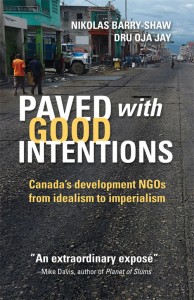by Noaman G. Ali
Paved with Good Intentions: Canada’s Development NGOs from Idealism to Imperialism
Nikolas Barry-Shaw and Dru Oja Jay
303 pages (262 pages excluding notes and index). Fernwood Publishing . $25.00.
 Nikolas Barry-Shaw and Dru Oja Jay’s book is about the world of NGOs, or non-governmental organizations — like Oxfam Canada, Plan Canada and the Montreal-based Alternatives — that are supposed to be helping lift people overseas out of poverty. The general misconception with NGOs is that they selflessly help poorer people, without concern for their political views or without concern for what our politicians try and impose.
Nikolas Barry-Shaw and Dru Oja Jay’s book is about the world of NGOs, or non-governmental organizations — like Oxfam Canada, Plan Canada and the Montreal-based Alternatives — that are supposed to be helping lift people overseas out of poverty. The general misconception with NGOs is that they selflessly help poorer people, without concern for their political views or without concern for what our politicians try and impose.
Barry-Shaw and Jay pop this bubble at the outset by showing how Alternatives supported the violent overthrow of a popular, democratically elected government in Haiti in 2004. Alternatives used its reputation as a left-wing, pro-development NGO to support the actions of the Canadian government, which played a central role in the coup by funding all kinds of anti-democracy groups and putting Canadian boots on the ground. It just so happens that Alternatives was receiving funding from the official Canadian International Development Agency (CIDA).
Through the rest of the book, the authors trace the role of NGOs in facilitating Western governments’ imposing of restrictive and damaging neo-liberal policies on Global South countries. The projects often pursued by NGOs, like micro-financing, have not been shown to have large-scale impacts on poverty reduction. Instead of tackling the large-scale, political problems that plague Global South countries—especially the ways in which elites exploit and oppress the people—NGOs keep talking about small-scale improvements which don’t always come about.
The authors argue that NGOs keep people away from talking about the political reasons for poverty. In Canada, any NGO that receives government funding is required, by law, to keep itself out of any kind of political advocacy. In fact, the authors go into the history of Canadian NGOs to show how the Canadian government simply cut off the funding for many NGOs when, back in the 1960s and ’70s, they started to question and challenge the root causes of poverty and began engaging in solidarity with workers and peasants in Global South countries. Beaten into shape, NGOs then returned to simply focusing on their micro projects while clamouring for government funding.
Recently, NGOs have been integrated into the military strategies of countries like Canada and the US as they seek to invade and occupy countries like Afghanistan. Again, the point is for NGOs to present a softer face in what is an otherwise brutal war imposed on the Afghan people. Not only does this show the falsehood about NGOs’ supposed autonomy from political elites, it also makes it genuinely difficult for the poorest to access health and other services when they’re seen as an extension of the armies bombing you.
Large-scale poverty reduction and improvement in living standards, especially health and education, in countries such as Cuba and Venezuela has occurred through the political struggle of the masses of workers and peasants themselves. It’s true that people turn to NGOs with the best of intentions and may end up helping a few people along the way, but on the whole NGOs have never contributed to significant and lasting poverty reduction or empowerment anywhere near the scale achieved by these political struggles.
The authors stress that true anti-poverty initiatives would begin by asking why Western governments are so intent on preventing workers and peasants from challenging corrupt local elites, and by supporting those worker and peasant struggles in countries like Venezuela, the Philippines and India: Solidarity, not charity, is what should guide our own interventions.
This book is an eye-opener, and the authors make their arguments clearly through detailed case-studies covering the engagement of the Canadian government and Canadian NGOs with several Global South countries. The book should be required reading for all those who genuinely want to help end poverty and suffering anywhere.
Word has it that the authors will be coming to Toronto in September as part of a book tour, it’s well-worth checking out what they have to say in person.
Noaman researches the political economy of development at the University of Toronto.
Comments
I’m guessing the authors and reviewer are referring primarily to Canadian NGOs focused on international development and funded through CIDA…it is an important distinction to make, is it not?